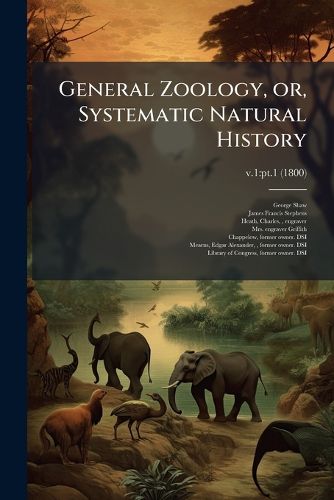Readings Newsletter
Become a Readings Member to make your shopping experience even easier.
Sign in or sign up for free!
You’re not far away from qualifying for FREE standard shipping within Australia
You’ve qualified for FREE standard shipping within Australia
The cart is loading…






"General Zoology, or, Systematic Natural History, v.1: pt.1 (1800)" is a foundational work in the field of zoology, presenting a comprehensive overview of the animal kingdom as understood at the turn of the 19th century. Authored by George Shaw and James Francis Stephens, this volume meticulously catalogs and describes various animal species, reflecting the scientific understanding and classification systems of the era.
The book offers insights into the early methods of natural history documentation and provides a valuable resource for understanding the historical development of zoological science. With detailed descriptions and engravings by Charles Heath and Mrs. Griffith, this work is a testament to the enduring human fascination with the natural world and the pursuit of knowledge.
This work has been selected by scholars as being culturally important, and is part of the knowledge base of civilization as we know it. This work was reproduced from the original artifact, and remains as true to the original work as possible. Therefore, you will see the original copyright references, library stamps (as most of these works have been housed in our most important libraries around the world), and other notations in the work.
This work is in the public domain in the United States of America, and possibly other nations. Within the United States, you may freely copy and distribute this work, as no entity (individual or corporate) has a copyright on the body of the work.
As a reproduction of a historical artifact, this work may contain missing or blurred pages, poor pictures, errant marks, etc. Scholars believe, and we concur, that this work is important enough to be preserved, reproduced, and made generally available to the public. We appreciate your support of the preservation process, and thank you for being an important part of keeping this knowledge alive and relevant.
$9.00 standard shipping within Australia
FREE standard shipping within Australia for orders over $100.00
Express & International shipping calculated at checkout
"General Zoology, or, Systematic Natural History, v.1: pt.1 (1800)" is a foundational work in the field of zoology, presenting a comprehensive overview of the animal kingdom as understood at the turn of the 19th century. Authored by George Shaw and James Francis Stephens, this volume meticulously catalogs and describes various animal species, reflecting the scientific understanding and classification systems of the era.
The book offers insights into the early methods of natural history documentation and provides a valuable resource for understanding the historical development of zoological science. With detailed descriptions and engravings by Charles Heath and Mrs. Griffith, this work is a testament to the enduring human fascination with the natural world and the pursuit of knowledge.
This work has been selected by scholars as being culturally important, and is part of the knowledge base of civilization as we know it. This work was reproduced from the original artifact, and remains as true to the original work as possible. Therefore, you will see the original copyright references, library stamps (as most of these works have been housed in our most important libraries around the world), and other notations in the work.
This work is in the public domain in the United States of America, and possibly other nations. Within the United States, you may freely copy and distribute this work, as no entity (individual or corporate) has a copyright on the body of the work.
As a reproduction of a historical artifact, this work may contain missing or blurred pages, poor pictures, errant marks, etc. Scholars believe, and we concur, that this work is important enough to be preserved, reproduced, and made generally available to the public. We appreciate your support of the preservation process, and thank you for being an important part of keeping this knowledge alive and relevant.